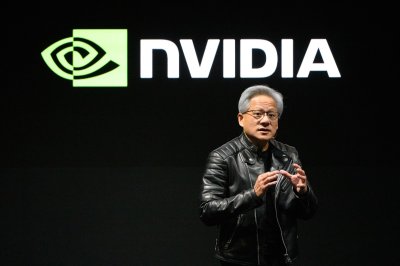Nvidia's AI Chip Production Halt: A Geopolitical Shift or Market Adjustment?
By: @devadigax

Nvidia, the dominant player in the high-performance computing (HPC) market, has reportedly halted production of its H100 and potentially other high-end AI chips, specifically targeting the Chinese market. While official confirmation from Nvidia is pending, reports suggest the move is linked to increased pressure from the Chinese government urging domestic adoption of homegrown AI chip technology. This unexpected development comes just weeks after the US greenlighted the sale of certain Nvidia chips to China, indicating a rapidly evolving and complex geopolitical landscape impacting the global AI industry.
The timing is particularly intriguing. Nvidia recently received approval to resume sales of its A800 and H800 chips in China, chips specifically designed to comply with US export restrictions aimed at preventing advanced technology from falling into the hands of potential adversaries. These restrictions, implemented amidst escalating US-China tensions, severely limited Nvidia's access to the lucrative Chinese market – a significant blow considering China's burgeoning AI sector and massive demand for high-performance chips.
However, the reported production halt on the more powerful H100 chips suggests a potentially more significant shift. The H100 represents Nvidia's state-of-the-art offering, crucial for training the most advanced AI models. The decision to halt production, even if temporary, raises questions about the efficacy and long-term viability of the US export control strategy. If China can readily find alternative solutions or successfully incentivize domestic chip development, the effectiveness of such restrictions comes into serious doubt.
Beijing's push for domestic chip reliance is not new. For years, the Chinese government has been investing heavily in its domestic semiconductor industry through initiatives like the "Made in China 2025" plan. The goal is to reduce dependence on foreign technology, particularly in strategic sectors such as AI, and establish technological self-reliance. This drive is fueled by both economic ambitions and national security concerns. China recognizes the strategic importance of controlling its own AI infrastructure and aims to create a robust ecosystem that minimizes vulnerability to foreign sanctions or technological embargoes.
The reported halt on H100 production could be interpreted in several ways. It could be a strategic response by Nvidia to manage potential risks associated with navigating the complex regulatory environment. By temporarily halting H100 production for the Chinese market, Nvidia may be attempting to avoid further scrutiny and potential delays related to export licenses. Alternatively, it might reflect a reassessment of the market demand considering the government’s push toward domestic alternatives. The Chinese market may be becoming less reliant on Nvidia's offerings as domestic companies gain traction.
This situation highlights the escalating tensions between the US and China regarding technological dominance. The AI chip industry is a critical battleground in this conflict, with both countries striving to secure leadership in this transformative technology. The implications extend far beyond the immediate financial impact on Nvidia; the move has broader implications for global innovation, international trade relations, and the future of AI development.
Independent analysts are divided on the long-term implications. Some believe this is a temporary setback for Nvidia, a strategic maneuver to navigate regulatory hurdles, and that demand for their chips will eventually rebound. Others argue that this marks a significant turning point, signifying the growing capability and influence of China's domestic chip industry. The success of Chinese companies in developing competitive alternatives will greatly influence Nvidia's future market share in China and potentially set a precedent for other technology sectors.
Ultimately, the reported halt on H100 production serves as a stark reminder of the geopolitics shaping the technological landscape. The story underscores the intense competition and strategic maneuvering between the world's leading superpowers, as they grapple for dominance in the rapidly evolving field of Artificial Intelligence. Further developments and official statements from Nvidia and the Chinese government will be crucial to understanding the full implications of this significant development. The situation will undoubtedly continue to evolve, demanding close monitoring by industry experts and policymakers alike.
The timing is particularly intriguing. Nvidia recently received approval to resume sales of its A800 and H800 chips in China, chips specifically designed to comply with US export restrictions aimed at preventing advanced technology from falling into the hands of potential adversaries. These restrictions, implemented amidst escalating US-China tensions, severely limited Nvidia's access to the lucrative Chinese market – a significant blow considering China's burgeoning AI sector and massive demand for high-performance chips.
However, the reported production halt on the more powerful H100 chips suggests a potentially more significant shift. The H100 represents Nvidia's state-of-the-art offering, crucial for training the most advanced AI models. The decision to halt production, even if temporary, raises questions about the efficacy and long-term viability of the US export control strategy. If China can readily find alternative solutions or successfully incentivize domestic chip development, the effectiveness of such restrictions comes into serious doubt.
Beijing's push for domestic chip reliance is not new. For years, the Chinese government has been investing heavily in its domestic semiconductor industry through initiatives like the "Made in China 2025" plan. The goal is to reduce dependence on foreign technology, particularly in strategic sectors such as AI, and establish technological self-reliance. This drive is fueled by both economic ambitions and national security concerns. China recognizes the strategic importance of controlling its own AI infrastructure and aims to create a robust ecosystem that minimizes vulnerability to foreign sanctions or technological embargoes.
The reported halt on H100 production could be interpreted in several ways. It could be a strategic response by Nvidia to manage potential risks associated with navigating the complex regulatory environment. By temporarily halting H100 production for the Chinese market, Nvidia may be attempting to avoid further scrutiny and potential delays related to export licenses. Alternatively, it might reflect a reassessment of the market demand considering the government’s push toward domestic alternatives. The Chinese market may be becoming less reliant on Nvidia's offerings as domestic companies gain traction.
This situation highlights the escalating tensions between the US and China regarding technological dominance. The AI chip industry is a critical battleground in this conflict, with both countries striving to secure leadership in this transformative technology. The implications extend far beyond the immediate financial impact on Nvidia; the move has broader implications for global innovation, international trade relations, and the future of AI development.
Independent analysts are divided on the long-term implications. Some believe this is a temporary setback for Nvidia, a strategic maneuver to navigate regulatory hurdles, and that demand for their chips will eventually rebound. Others argue that this marks a significant turning point, signifying the growing capability and influence of China's domestic chip industry. The success of Chinese companies in developing competitive alternatives will greatly influence Nvidia's future market share in China and potentially set a precedent for other technology sectors.
Ultimately, the reported halt on H100 production serves as a stark reminder of the geopolitics shaping the technological landscape. The story underscores the intense competition and strategic maneuvering between the world's leading superpowers, as they grapple for dominance in the rapidly evolving field of Artificial Intelligence. Further developments and official statements from Nvidia and the Chinese government will be crucial to understanding the full implications of this significant development. The situation will undoubtedly continue to evolve, demanding close monitoring by industry experts and policymakers alike.
Comments
Related News

OpenAI Unveils ChatGPT Atlas: Your Browser Just Became Your Smartest AI Assistant
In a move poised to fundamentally reshape how we interact with the internet, OpenAI has officially launched ChatGPT Atlas, a gr...
@devadigax | 22 Oct 2025
In a move poised to fundamentally reshape how we interact with the internet, OpenAI has officially launched ChatGPT Atlas, a gr...
@devadigax | 22 Oct 2025

Netflix Doubles Down on Generative AI, Challenging Hollywood's Divide Over Creative Futures
In a move that underscores a growing chasm within the entertainment industry, streaming giant Netflix is reportedly going "all ...
@devadigax | 21 Oct 2025
In a move that underscores a growing chasm within the entertainment industry, streaming giant Netflix is reportedly going "all ...
@devadigax | 21 Oct 2025

AI Agent Pioneer LangChain Achieves Unicorn Status with $1.25 Billion Valuation
LangChain, the innovative open-source framework at the forefront of building AI agents, has officially joined the exclusive clu...
@devadigax | 21 Oct 2025
LangChain, the innovative open-source framework at the forefront of building AI agents, has officially joined the exclusive clu...
@devadigax | 21 Oct 2025

Meta Boots ChatGPT From WhatsApp: A Strategic Play for AI Dominance and Walled Gardens
In a significant move that reshapes the landscape of AI chatbot accessibility, OpenAI has officially confirmed that its popular...
@devadigax | 21 Oct 2025
In a significant move that reshapes the landscape of AI chatbot accessibility, OpenAI has officially confirmed that its popular...
@devadigax | 21 Oct 2025

Meta's New AI Peeks Into Your Camera Roll: The 'Shareworthy' Feature Raises Privacy Eyebrows
Meta, the parent company of Facebook, has rolled out a new, somewhat controversial artificial intelligence feature to its users...
@devadigax | 18 Oct 2025
Meta, the parent company of Facebook, has rolled out a new, somewhat controversial artificial intelligence feature to its users...
@devadigax | 18 Oct 2025
 AI Tool Buzz
AI Tool Buzz